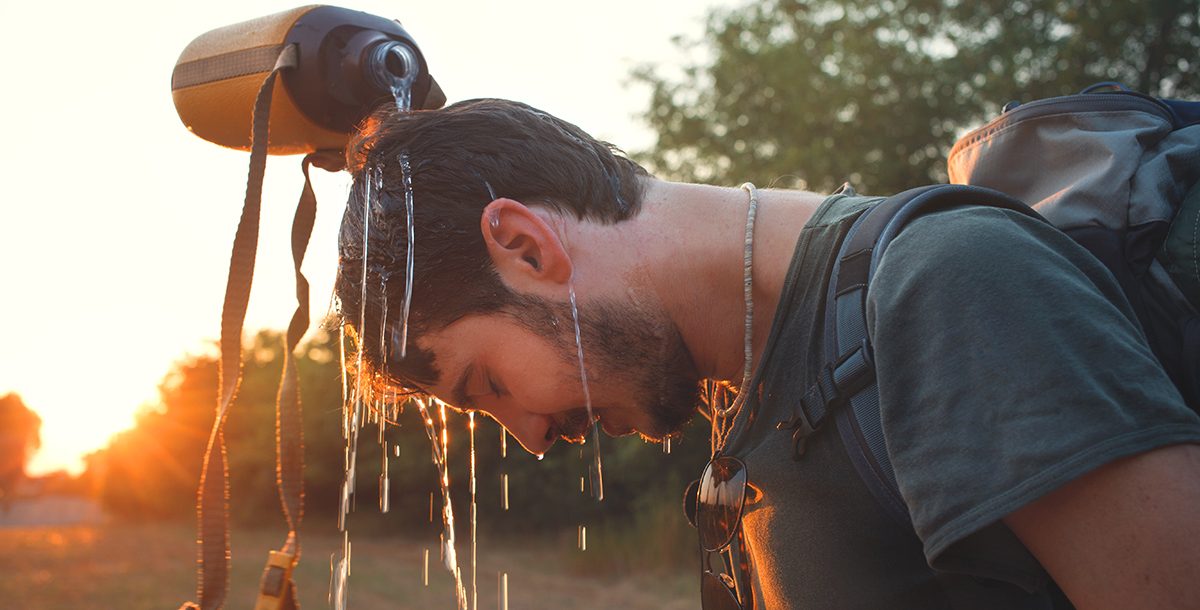Summer weather is heating up and is only getting hotter! As the temperatures increase, your body has to work harder to function when you spend time outdoors. Our team at Bon Secours has some summer heat safety tips to help make sure you are safe and healthy when you must be outside.
Summer heat safety tips
Planning ahead is the key to avoiding heat-related illness. Be sure to follow these summer heat safety tips during hot weather.
- Stay hydrated by drinking plenty of fluids, even if you don’t feel thirsty
- If possible, try to avoid direct sun exposure between 10 a.m. and 4 p.m.
- Wear loose, lightweight and light-colored clothing
- Slow down and stay indoors
- Take cool showers or baths when returning from outside
- Wear sunscreen and wide-brimmed hats to block the sun
- Check on family, friends, children and neighbors who may be at risk for heat-related illness
- Don’t forget pets and make sure they have plenty of cool water
- If someone doesn’t have air conditioning, help them stay cool by going to a cooler location, such as a library, mall or movie theater
The first signs of dangerous heat-related illness are often a headache, flushed skin, nausea, vomiting and an altered mental state. As the temperature rises, your body’s natural cooling mechanism – sweating – evaporates and helps to cool your body. But on those really hot, humid days, evaporation of sweat slows, and your body runs a higher risk of heat-related illness, like heat exhaustion or heat stroke. Heat exhaustion is a precursor to heat stroke.
Signs of heat exhaustion include:
- Pale skin
- Fatigue or weakness
- Dizziness or nausea
- Profuse sweating
- Rapid pulse or fast, shallow breathing
- Muscle cramping or weakness
If you or someone near you is experiencing these symptoms, take the following steps:
- Move to a cool location
- Lie down and loosen clothing
- Apply cold, wet cloths
- Sip water or other fluids with salt or sugar
- Do NOT drink caffeine or alcohol
- If you or the individual has vomited and it continues, seek medical attention immediately. Also, if you don’t feel better within 30 minutes, seek medical help.
Heat exhaustion is a precursor to heat stroke. This means that heat exhaustion can progress to heat stroke if not treated.
These more dangerous warning signs can indicate heat stroke is imminent:
- Skin that feels hot and dry
- Confusion or loss of consciousness
- Throbbing headache
- Frequent vomiting
- Trouble breathing
Heat stroke is an emergency. If you think someone is experiencing symptoms, take immediate action:
- Seek medical attention and dial 9-1-1
- Move them to a cool location
- Reduce their body temperature with a cool bath or cloths
- Do not give them any more fluids
Most healthy people can tolerate heat exposure using prevention methods. However, people with damaged or weakened hearts, the elderly and those who are overweight can have a much harder time coping physically with heat and need to take precautions to prevent heat-related illness and death.
These high-risk categories include:
- Having previously had a heart attack. Damage from a heart attack can keep the heart from pumping enough blood to get rid of heat.
- High cholesterol/arterial disease. Cholesterol-narrowed arteries can limit blood flow to the skin.
- Stroke, Parkinson’s disease, Alzheimer’s disease, diabetes. These and other conditions can dull the brain’s response to dehydration, so it may fail to send thirst signals.
- Atrial fibrillation. The main concern for atrial fibrillation in high heat is dehydration, which can trigger an arrhythmia. It can also raise the risk of stroke and heart failure.
- Medications. Certain medications – beta blockers, ACE receptor blockers, ACE inhibitors, calcium channel blockers and diuretics – can exaggerate the body’s response to heat.
It’s best to consult with your primary care provider about how to stay healthy and safe in high heat. Find a Bon Secours provider near you today.





